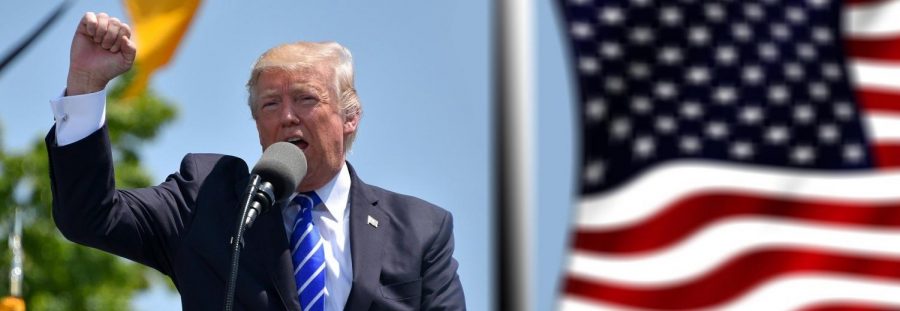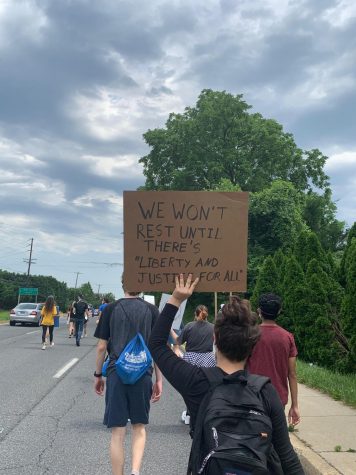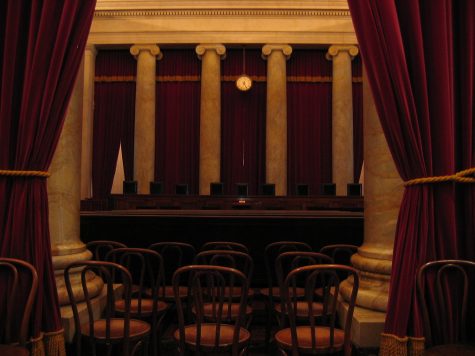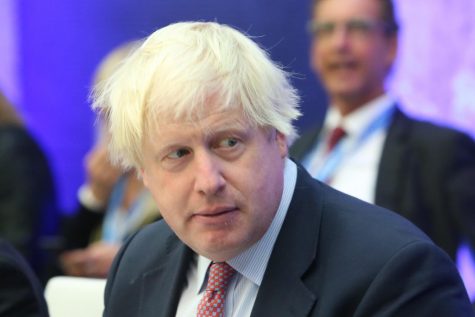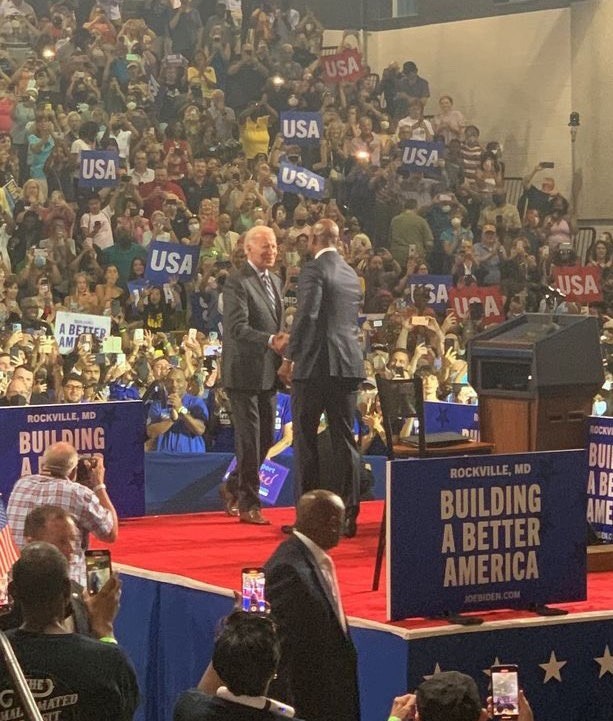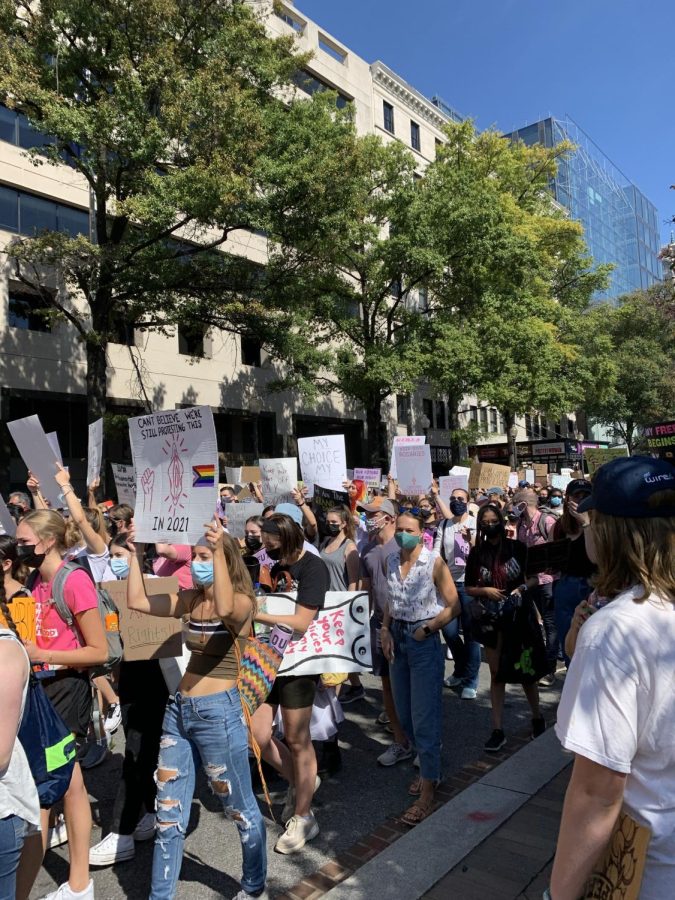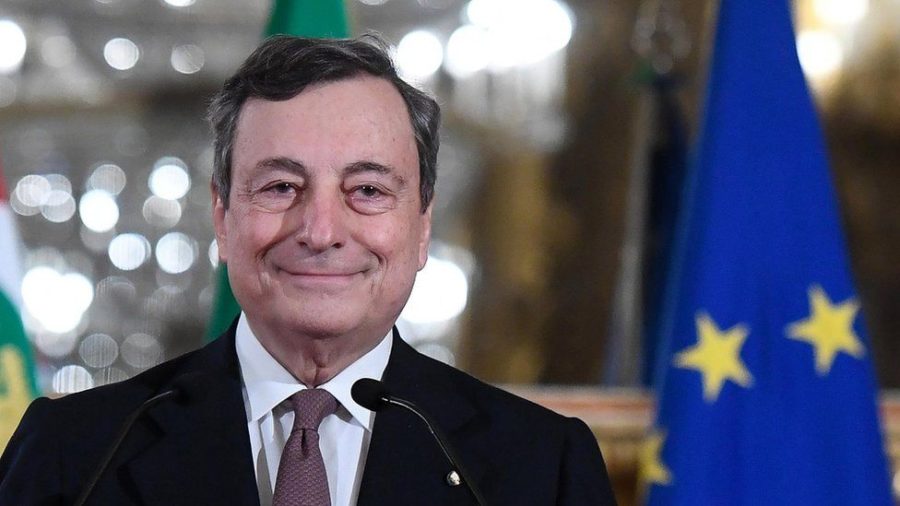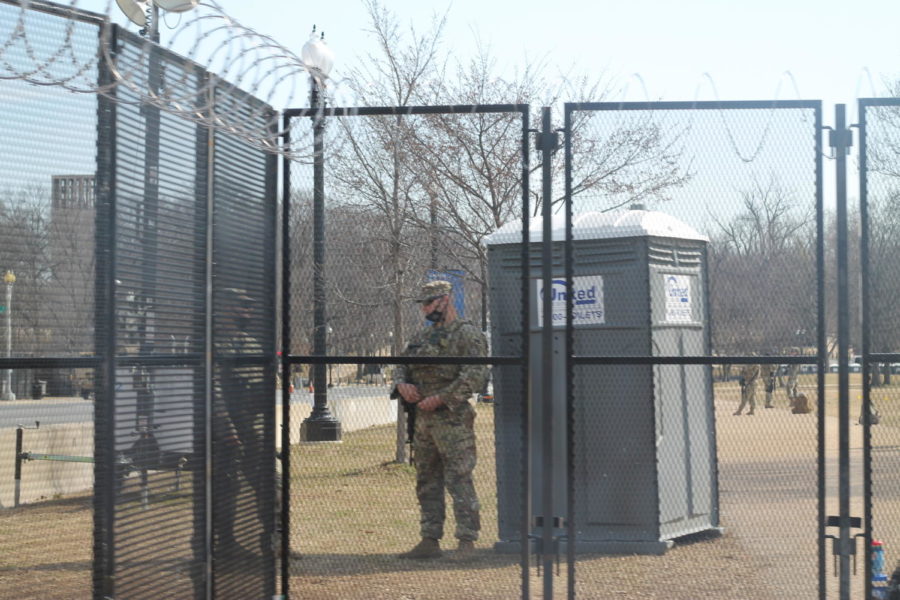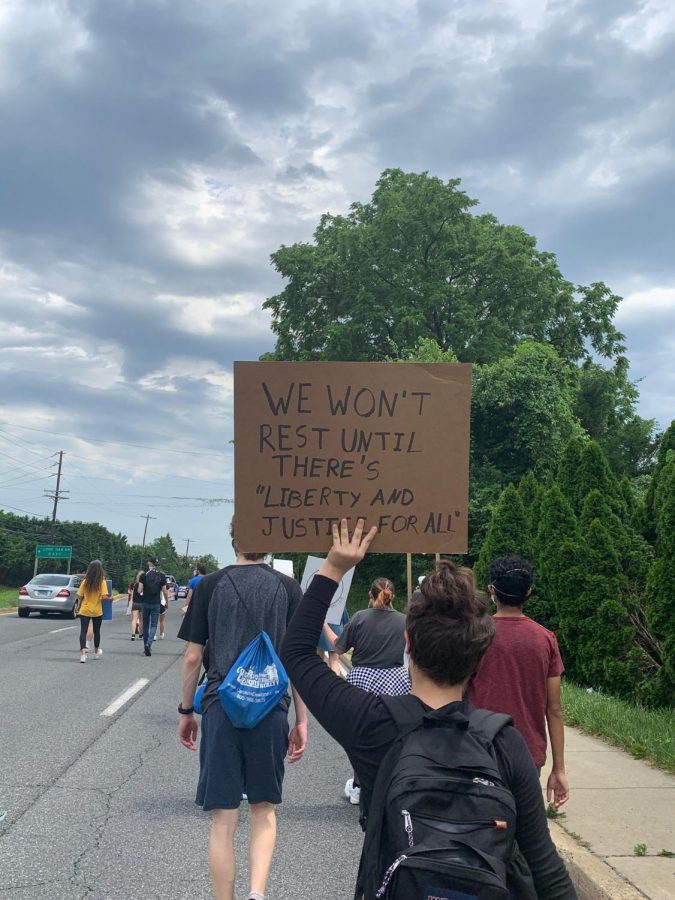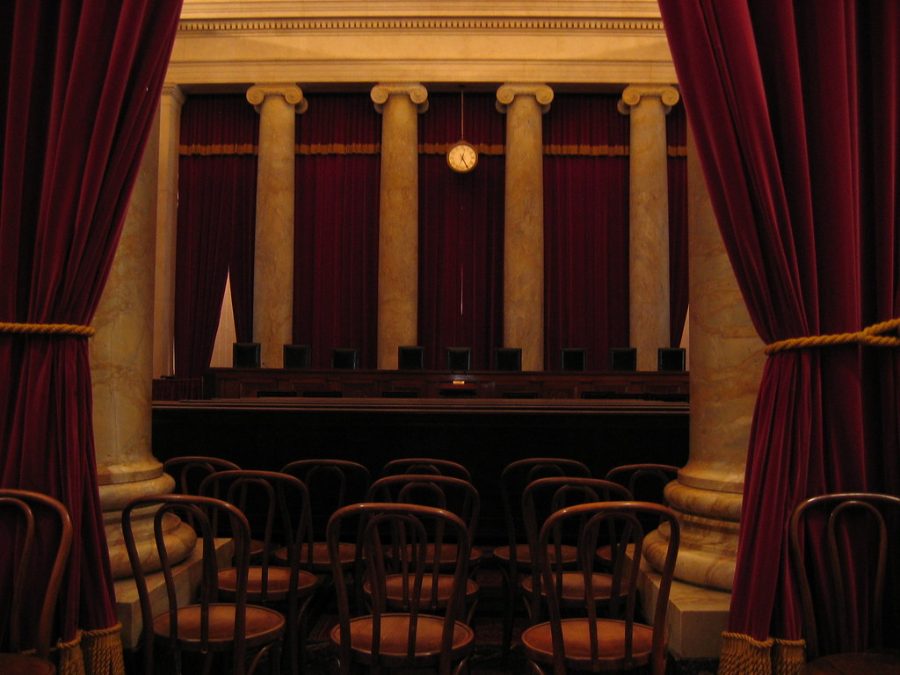Donald Trump secured his spot as the 45th U.S. president on November 9, 2016. Despite losing the popular vote to Democratic Nominee Hilary Clinton by 2.9 million votes, Trump had 304 electoral college votes compared to Clinton’s 227 votes. Trump was inaugurated on January 20, 2017, by Chief Justice John Roberts, starting his four-year term as President.
The Inauguration of Trump resulted in a walkout at WJ, with students leaving class and going to the bleachers to chant “not my president.”
In an interview in 2017, then-senior Andrew Burklow voiced his support for the WJ protestors.
“These people are being active and raising awareness. You can’t just sit at home and do nothing. I think it’s a positive thing,” Burklow said.
However, some opposed the protest, seeing it as unproductive. Then-freshman Amir Azadikhah sounded his concern in a 2017 interview.
“Honestly I have nothing against Trump,” Azadikhah said. “He is our President and I don’t think fighting it will do anything. And I don’t think protesting will change that. I understand why they’re protesting, but he hasn’t done anything as president.”
Trump had a Republican majority in both houses of Congress when he was sworn in, giving him the platform to enact his “100-day pledge”, a “contract” Trump made with voters. Trump made 38 specific promises that he said he would enact in his first 100 days in office. However, of those 38 promises, only 10 were fulfilled. His most notable accomplishment within the first 100 days as President was the confirmation of Neil Gorsuch as an associate justice of the Supreme Court while his biggest shortcoming was his inability to repeal the Affordable Care Act (Obamacare).
In 2017, Trump enacted a travel ban on Syrian refugees and barring citizens from seven countries for 90 days: signed an executive order requiring for every new piece of federal regulation, two prior regulations must be rescinded: enacted a second travel ban: ordered a missile strike on a Syrian airfield: dropped a MOAB bomb on ISIS targets in Afghanistan: fired James Comey the Director of the F.B.I.: withdrew from the Paris climate deal: ended DACA: enacted a third travel ban: recognized Jerusalem as the capital of Israel: signs a $1.5 trillion tax cut: and notably: the Mueller investigation.
“The investigation has been dragged out for months and they still don’t have solid evidence on him [Trump],” then-senior Josh Franks said in an interview in 2018.
The Mueller investigation spanned from 2017-2019, focused on finding out if Russia interfered with the 2016 presidential election. The investigation, conducted by special prosecutor Robert Mueller, looked to see if links existed between associates of Trump and Russian officials and the possible obstruction of justice by Trump.
“Economically we’re doing great so this investigation doesn’t overshadow his achievements. The media never talks about how well he is doing but instead about this long investigation,” Franks said at the time.
Trump’s second year of presidency proved to be much more challenging as he battled the Mueller investigation and the gridlock resulting from the 2018 midterm elections where Democrats won the House while Republicans sustained control of the Senate.
Franks expressed his lack of confidence in Trump’s ability to fulfill his agenda with only one Republican chamber of Congress remaining in an interview in 2018.
“The Democrats are moving more far left while Republicans are moving more far right simultaneously. This is definitely going to slow down how productive Trump is,” Franks said.
Despite the gridlock, Trump still did a lot during his second year of presidency. Throughout the year he: shut down the government for three days, delivered his first State of the Union address, signed orders imposing harsh tariffs on imported steel and aluminum, launched airstrikes against Syria over a suspected chemical weapons attack, pulled out of the Iran nuclear deal, moved the American Embassy in Israel to Jerusalem, established a “zero-tolerance” immigration policy that separated families, signed an executive order ending family separation at borders, met with Kim Jong-un to discuss denuclearization of the Korean Peninsula, negotiated a new trade deal with Mexico and Canada to replace Nafta, brought U.S. unemployment rate down to 3.7%, passed the First Step Act with bipartisan support to start criminal justice overhaul, ordered the removal of American troops from Syria, directed the downsizing of forces in Afghanistan and the controversial Supreme Court nomination of Associate Justice Brett Kavanaugh.
“I personally don’t forgive that type of behavior, no matter at what age. I believe that everyone makes mistakes, but a mistake that severe is very tough to be forgiven,” then-sophomore Santino Calcagno said in an interview in 2018.
Kavanaugh became the center of controversy when allegations arose from his past when he attended Georgetown Prep school in Bethesda, MD. Dr. Christine Blasey Ford publicly claimed that she was sexually assaulted in 1982 when both she and Kavanaugh were teenagers. Many people, like Calcagno, found this hard to overlook, but despite the allegations, Kavanaugh was confirmed by the Senate.
Trump also faced a lot of backlash as many of his past colleagues testified against him and evidence was brought to light. In 2018, Trump’s personal lawyer Michael Cohen admitted to paying $130,000 out of his own pocket to Stormy Daniels, an adult actress who claimed to have an affair with Trump, which Trump denied. Hope Hicks, the White House communications director, told House investigators that her work for Trump had occasionally required her to tell white lies, resulting in her resignation the next day. The special counsel subpoenaed the Trump Organization to release documents, some related to Russia. Trump’s lead lawyer for the special counsel investigation resigned. The F.B.I. raided Cohen’s hotel room and office. Trump’s former campaign chairman was convicted of five counts of tax fraud, two counts of bank fraud and one count of failure to disclose a foreign bank account.
Cohen later pleaded guilty to multiple crimes in court and said that Trump had directed him to pay Daniels and another woman to keep them quiet during the 2016 election, which was affirmed months later by Federal prosecutors. Cohen also pleaded guilty to lying to Congress and stated that Trump had more involvement in a potential Russian business deal during his presidential campaign than previously known.
Trump’s third year as President started on the 11th day of his partial government shutdown. The shutdown, started on Dec. 22, 2018, was in response to Congress refusing to give Trump $5.7 billion in federal funds for a U.S.-Mexico border wall. The lockdown lasted a total of 35 days, the longest lockdown in history, costing the economy an estimated at least $11 billion.
“Not knowing when my dad’s next paycheck would be coming was extremely frustrating and scary for [my parents],” then-senior Krithi Sriram said in an interview in 2019.
In 2019, Trump continued to fight unemployment and create jobs, left the government shutdown fight with less than he was initially offered, used his emergency powers to get funding for his border wall, implemented stricter work requirements for food stamps, supported pro-democracy protestors in Hong Kong, got Mexico to start enforcing their illegal immigration policy through tariff threats, enacted a “Protect Life Rule” that dealt a detrimental blow to Planned Parenthood, ordered the operation that killed Islamic State leader Abu Bakr al-Baghdadi, continued to appoint Federal judges giving conservatives control over 7 of 13 circuit courts and withheld a military aid package for Ukraine leading to a political scandal and impeachment.
Then-senior and President of the WJ Young Democrats Club Alexander Bove offered his opinion on the impeachment inquiry in 2019.
“I think there is very strong evidence to suspect [the accusations] are true. I personally think they probably are, just looking at Mr. Trump’s record of various illegal doings,” Bove said.
A whistleblower complaint made in September of 2019 raised the concern that Trump was using his political authority to interfere with the U.S. 2020 Presidential election. The whistleblower claimed that Trump pressured the Ukrainian president into investigating the Biden family dealings in Ukraine by withholding $400 million dollars in military aid. Democrats claimed that Trump did this to gain an edge in the 2020 election, resulting in the drafting of the articles of impeachment.
“I think the accusations are a little absurd, I mean I just don’t get where they are coming from,” then-junior Patrick Kemp said in an interview in 2019.
The Senate agreed with Kemp and acquitted Trump of the charges brought about by the Democrat-led House for abusing the power of his office and obstructing Congress.
The global pandemic of COVID-19 made 2020 a much different year for Trump. The first confirmed case in the U.S. was in Washington on January 21. Trump assured Americans it was nothing to worry about, only lightly restricting China travel bans and lightly investing in studying the virus.
Come March 13, and Trump declares a national emergency regarding COVID-19 which freed up billions in federal funding. Trump later signed a $2.2 trillion relief package that included direct cash to citizens, additional funds for hospitals and loans for businesses. The Whitehouse also published their social distancing campaign in mid-March. However, the virus continued to spread.
On April 30, Trump allowed the federal “Stay at Home” guidelines to expire, ceding the field to state efforts. Then-senior Miles Carr commented on government handlings on the virus in an interview in 2020.
“I think our state government is handling the coronavirus much better than our national government. Larry Hogan was quick to temporarily shut down the state which was vital in stopping the spread,” Carr said.
In addition to combatting COVID-19, Trump also nominated a third Supreme Court Justice.
“I believe that Barrett will not correctly represent the public because of incorporating her Catholic beliefs in her beliefs and I don’t think she’ll be able to separate from church and state,” then-junior Sara Susa said in an interview in 2020.
Trump nominated Justice Amy Coney Barrett after the passing of Justice Ruth Bader Ginsberg. Republicans and Democrats fought over whether Trump should be able to nominate a justice weeks before the election but Republicans persevered as Barrett was confirmed on October 26, a week before the presidential election.
For the election, Democratic nominee Joe Biden was Trump’s challenger, who ended up receiving 51.4% of the popular vote. After winning the popular vote, it was up to the Electoral College to finalize the election. As votes were being certified in the U.S. Capitol on January 6, hundreds of Trump supporters and the far-right stormed the Capitol Building. The chaotic scene took place during a “Stop the Steal” rally which was attended by Trump supporters. Trump spoke at and promoted the rally, causing many to accuse him of inciting the riot.
In response to Trump’s rally, multiple members of Congress called on Vice President Mike Pence to invoke the 25th Amendment on Trump to remove him from office. However, their attempts failed so the House of Representatives decided to swiftly move to impeach Trump again, voting on an impeachment resolution seven days later. The resolution passed with bipartisan support, with 10 Republicans in favor. Trump has made history as the first U.S. President to be impeached twice. It is now up to the Senate to decide to convict Trump or not which could make him the first President to be convicted by the Senate and also prevent him from ever holding office again.
“It [the impeachment reason for impeachment] is not a legitimate argument, they [the Democrats] tried to do the same thing when Trump talked to the Ukrainian President,” senior James Byrd said.
After the riots, the Electoral College votes confirmed Biden as the 46th President of the U.S. despite the delay. Trump left office peacefully and Biden was inaugurated on January 20.
“I think the outcome [of the election] comes with a grain of salt as this is a time with major disagreement and polarization. In my opinion the main con to take away is the fact that people around the country were made to question the legitimacy of it,” sophomore Keenan Ramsay said.


































